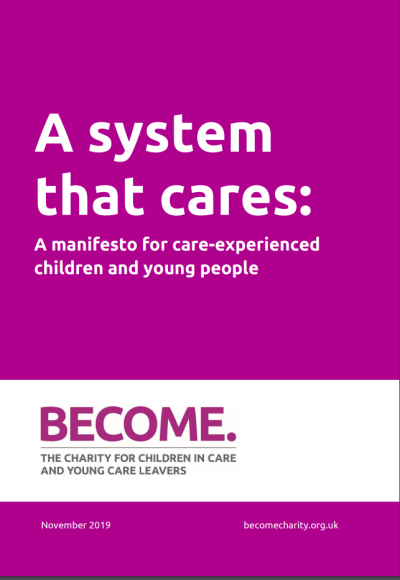Learning to Care

By Sam Turner from Become, the charity for children in care and young care leavers
This month, we released our manifesto – A system that cares – which outlines our key asks of the next government to support care-experienced children and young people.
We’re calling for all of the main political parties to commit to a comprehensive independent review of the care system which listens to those with lived experience, to focus on the continuity of relationships and stability for all children, and to ensure all care-experienced young people can access the mental health support they need to heal and thrive.
However, change isn’t only required within the care system itself.
Young people’s experiences in education can have a huge impact on their ability to manage the difficulties which arise from experiences of trauma and the instability of life in care. For some children, school might be a place of support and sanctuary, but for others, their experience in the classroom might act to compound the difficulties they face outside of the school gates.
Training and support – Every young person in care deserves a place in an inclusive school which welcomes them, addresses their needs and works closely with children’s services and Virtual School teams so they are well supported to pursue education and realise their aspirations.
Within our manifesto, we highlight our concerns about the increasing use of ‘zero tolerance’ behaviour policies on pupils who have experienced childhood adversity. The work of the Rees Centre and others in exploring teacher training in attachment and trauma awareness demonstrates the value of this approach in improving wellbeing and learning outcomes for whole cohorts, not just those with experience of care.
Our own Teachers Who Care report released last year highlighted a significant training gap in the needs of children in care: 87% of respondents received no training about looked after children before they qualified as a teacher. We want to see mandatory pre-qualification and continued training for all teachers which emphasises a compassionate understanding of childhood trauma and the impacts of care on learning and behaviour.
Admissions and exclusions – We are also calling for a revised School Admissions Code which ensures children in care are not denied a place in the school which is best for them. The current Code acknowledges that a local authority “has no power to direct” an Academy school to admit a looked after child.
A parliamentary question from Emma Lewell-Buck last year highlighted that 28 appeals had been made by local authorities after a refusal by an Academy from March 2017 – May 2018, and the Secretary of State was forced to provide formal direction four times to ensure a child in care was given the place they deserve. Academy and free schools now make up 75% of secondary schools and must be required to follow the same rules as local authority-maintained schools.
In addition, we want to see new initiatives which bring together local authority and school staff to prevent the growing use of fixed-term exclusions with children in care. As identified in the recent Timpson review, looked after children are more than five times more likely to have a fixed-term exclusion than all children. Repeated time away from the classroom impacts not only on children’s attainment, but their emotional wellbeing, sense of identity and belonging.
We look forward to working alongside the Rees Centre and others to ensure the next government makes a commitment to improving educational experiences of all children in care. Not all challenges can be solved in a classroom, but creating a caring and supportive school environment for all pupils must be a top priority for whoever comes out ahead on December 12th.
Sam Turner, Voice and Influencing Manager, Become
Contact Sam: Sam.Turner@becomecharity.org.uk
The Rees Centre welcomes guest blog posts from professionals across the sector. Views expressed are the authors’ own and do not represent those of the Rees Centre.
